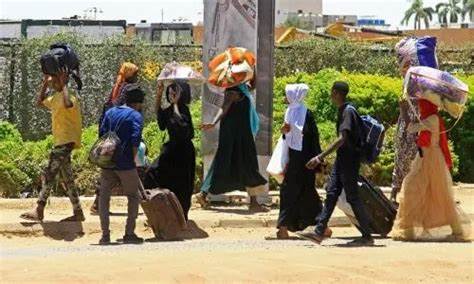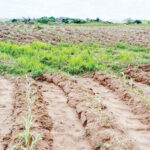As two old friends, General Abdel-Fattah Burhan and General Mohammed Hamdan Dagalo, hold Sudan to ransom, unsure of how to share state power between themselves since the coup that handed them maximum control of a country once under the enterprise of Omar Al-Bashir, the conversations around the resulting war have stirred an uncomfortable atmosphere in Nigeria. With air transportation grounded and aircraft seen burnt in aerial images from Khartoum, Nigerian students are among the vulnerable demographic stranded there, and their dilemma has led some of their countrymen to ask, “What are Nigerians doing in Sudan?”
Various conversations on social media have sparked curiosity due to condescending, sensationalised, and unmistakably prejudiced portrayals of Northern Nigerians as a demographic rushing to the epicentre of terrorism, war, and substandard education. Each narrative is inspired by palpable insularity or bigotry, and none bothers to understand and contextualise the historical interactions between Nigeria, especially the North, and Sudan. Most people do not even know the country beyond the CNN snippets of its wars and riots.
But Sudan isn’t the banana republic they imagine, one with no enduring institutions for learning. It has had over a century of health professions education and an evolved medical education system that attracts undergraduate and postgraduate medical students from across the world. They had a university for more than half a century before Nigeria had one, and this fact is lost on stereotype artists who’ve rushed to question why Nigerians seek education there.
Beyond Sudan’s primacy in tertiary education, Northern Nigeria and Sudan have had historical interactions, migrations, and cultural similarities that drive exchanges of ideas and values, and, unsurprisingly, even the first Grand Khadi of Northern Nigeria was a Sudanese man of Kanuri and Arab ancestry, Sheikh Muhammad Ahmad Awad. He was in charge from 1960 to 1962, after years of teaching and mentoring a generation of teachers and scholars produced by the famous Kano Law School.
- How hoodlums forced cancellation of Sallah durbar in Minna
- Tenants chase landlord away for demanding rent
Even the idea for the Kano Law School was inspired by Sudan and modeled after Sudan’s own Gordon College, which was established by the British colonial government in 1902 and functioned in the shadow of the University of London. The Kano Law School, which was founded as the Northern Provinces Law in 1934, was first overseen by Sudanese scholars, notably Sheikh Bashir Rayyan, Sheikh Muhammad Salih, and Sheikh Nur. The British colonial government in Nigeria preferred Sudan because of its successful adoption of secular education and rejection of militant values.
Gordon College evolved into the University of Khartoum, and, along with other Sudanese tertiary institutions, it served as an intellectual destination for various generations of Muslim students and scholars in Nigeria. Nigeria’s former Governor of the Central Bank of Nigeria and the 14th Emir of Kano, Muhammadu Sanusi II, obtained a master’s degree in Islamic Jurisprudence at a Sudanese university in the 90s—and he’s one of the most cerebral public servants Nigeria has ever had. This Sudanese education, which some tend to treat with condescension in their bigoted commentaries, guided him in reforming Islamic banking in Nigeria during his stewardship at the apex bank.
It would also be laughable to portray Sudan as a hub of substandard education in a country that rushes to the French-speaking Benin Republic for months-long bachelor’s degrees. Even the stereotypical point about Sudan being a breeding ground of religious extremism must have originated from uncritical consumption of the wrong news channels because the uprising in Sudan was instigated by clamouring for liberal democracy, and the people were unified for that purpose when they protested and ended Al-Bashir’s authoritarian regime in 2019.
The Islamophobic mindset that studying in Sudan, a Muslim country, is a radicalising exercise misses that some of the most notorious international terrorists we’ve seen were made in the West, including Nigerian-born Umar Farouk Abdulmutallab, who was studying Engineering at University College London when he fell apart.
The ultimate hypocrisy in this outrage is that, a few months ago, when Nigerian students were begging to be rescued from Ukraine, a European country, these Sudan-bashing patriots were not around to write strongly-worded letters about why the stranded students chose to study in an unstable and war-prone country. None of them reminded the nation that Ukraine is a third-world country with blue-eyed, blonde-haired people. Despite the Russo-Ukrainian War that began in 2014, Nigerians from all parts of the country are still studying in the vicinity. Those who did not question the choice of the war zone have found their voice to condemn Sudan, simply because it is a Muslim or African country.
Interestingly, the Sudan-bashing mob knows quite well the reason Nigerians rush to study abroad—this fear of studying a five-year programme for about a decade. They also missed that Sudan, for the Nigerians there, isn’t just for the affordability of the school.
A lot of the Nigerian students in Sudan are from comfortable middle-class families that pay huge sums in tuition and other fees to give their children decent education at private institutions in a culturally familiar foreign country close to their home.
What the mob has also failed to grasp is that distance and learning environment matter to these parents. Adapting to a new environment isn’t an easy cultural dislocation for some of the students, most of whom are young and impressionable, and Sudan offers these northern or Muslim students that avenue to study without the culture shocks or civilizational crisis, which even cosmopolitan black African students experience in the West.
This episode shows that some of us don’t understand the essence of building intercultural bonds with our neighbours, a gap that breeds the trending ignorance about our history. But, beyond the security dimension, if we can’t write off the distant Ukraine as just a place of war, Sudan too deserves the benefit of the doubt. It’s more than its war. Even if Nigeria has a first-rate education system, it would still be valid for any citizen to seek education in Sudan or anywhere on and off this planet.
Learning knows no boundaries, and exploring new places is a part of the journey. There are people elsewhere who also wonder why there are still human beings living in Nigeria, believing the entire country is at war, and overrun by Boko Haram. This isn’t even the time to point fingers stained with prejudice.

 Join Daily Trust WhatsApp Community For Quick Access To News and Happenings Around You.
Join Daily Trust WhatsApp Community For Quick Access To News and Happenings Around You.


